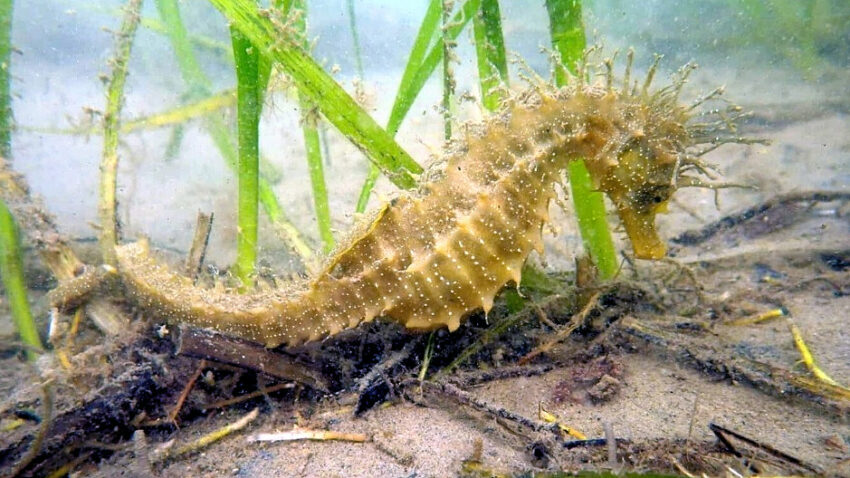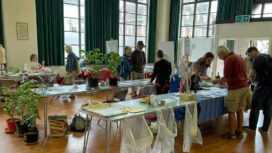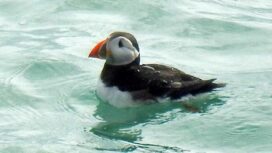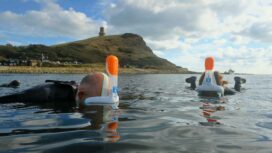A fundraising effort which will help to save seahorses and seagrass meadows in Studland Bay has been described as phenomenal by the organisers.
The £66,000 raised will pay for 22 new eco moorings to be installed in the voluntary no-anchor zone in Studland Bay, to build on the successful experiment through summer 2022 when seagrass meadows in the shallow waters began to recover.
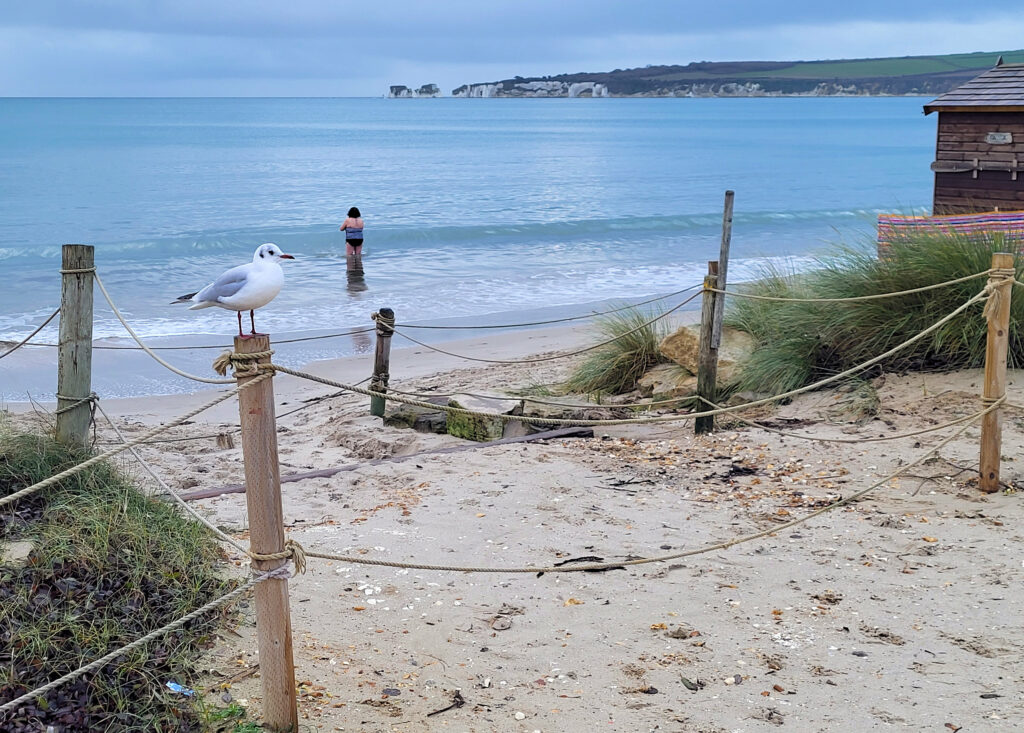
A view out over the seahorse territory in Studland Bay from Middle Beach
Moorings to be installed in April and May 2023
It was achieved through crowdfunding through January and February 2023.by the Seahorse Trust, supported by substantial donations from Studland hotel and restaurant The Pig on the Beach, the National Trust and the Crown Estate.
It is hoped to install the extra mooring points in April and May 2023, before Studland’s spiny seahorses start coming back into the bay, and plans are under way to step up fundraising for even more.
Individual buoys may be sponsored by Purbeck businesses and carry advertising to make them more attractive to environmentally aware backers, and donations may be sought from people who moor up to them during the summer.
A phone app has been developed along the lines of Just Park, which would ping an approaching boat, explain the objectives of the eco moorings and ask for a voluntary payment to moor there.
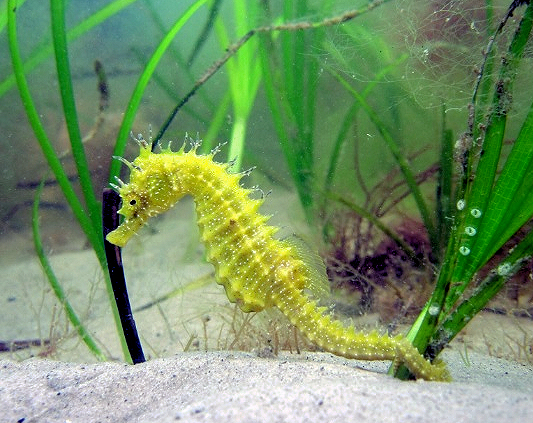
A juvenile female spiny seahorse in Studland’s seagrass meadow
Important site for the spiny seahorse
The next phase of the bid to save Studland’s seahorses has been planned by Studland Bay Marine Partnership, which worked with the UK Government’s Marine Management Organisation to establish a marine conservation zone in the bay.
Trials were held in 2022 with an initial 10 eco moorings and a study by the University of Southampton using advanced underwater technology reported it to be an early success.
The site is internationally important for its seagrass meadow and its population of spiny seahorses, both of which were affected by an increase in the number of boats visiting the site.
After a record number of 40 specimens were recorded in the bay in 2008, numbers dwindled until none were seen from 2015 until September 2017 when just one solitary female was spotted.
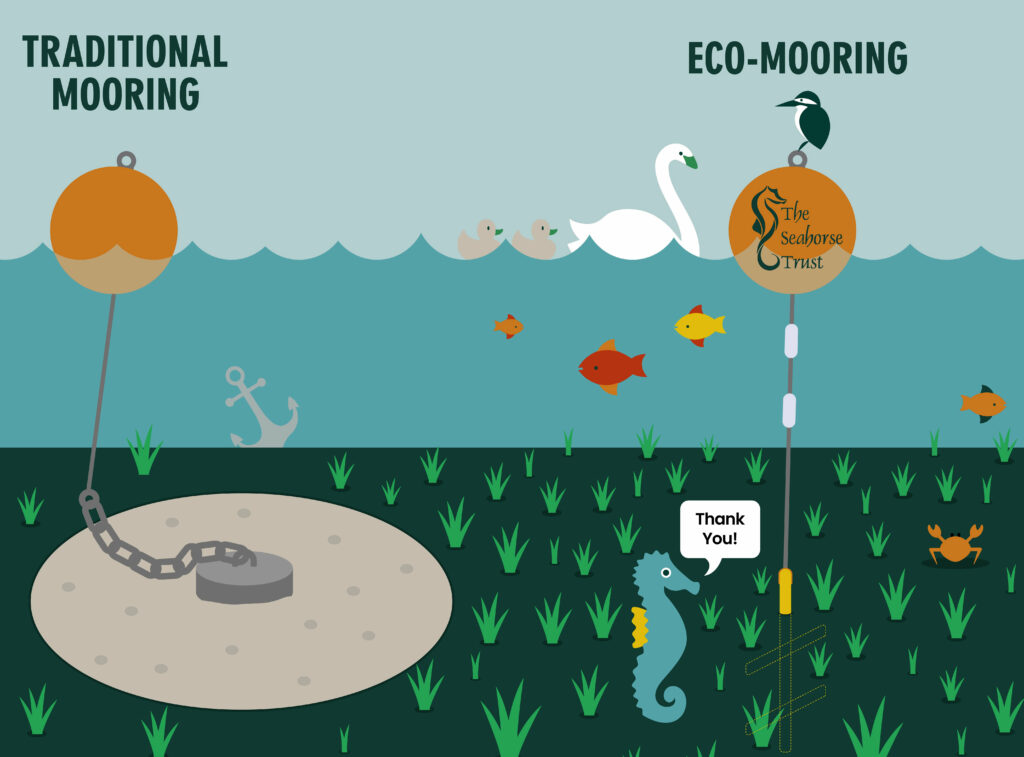
Eco moorings can be used in the middle of seagrass without causing damage
Eco friendly alternative to anchors
It took the effects of lockdown when there was very little activity in the bay for the seahorses to return in any numbers, peaking at 46, and the partnership decided that something had to be done to preserve their environment.
Traditional moorings and anchors drag along the seabed after being dropped, uprooting the seagrass meadows where the seahorses spend much of the year.
But eco moorings offer an environmentally friendly alternative, with a screw anchor installed permanently into the seabed with elastic ropes attaching the mooring buoy which stretch at high tide and contract at low tide, so they don’t pull on the sea bed.
The Seahorse Trust plans to install up to 100 of the eco moorings in the south of Studland Bay, between Handfast Point and Middle Beach, subject to both government approval of the scheme on that scale and raising enough money to fund it – an estimated £350,000 to complete the scheme.
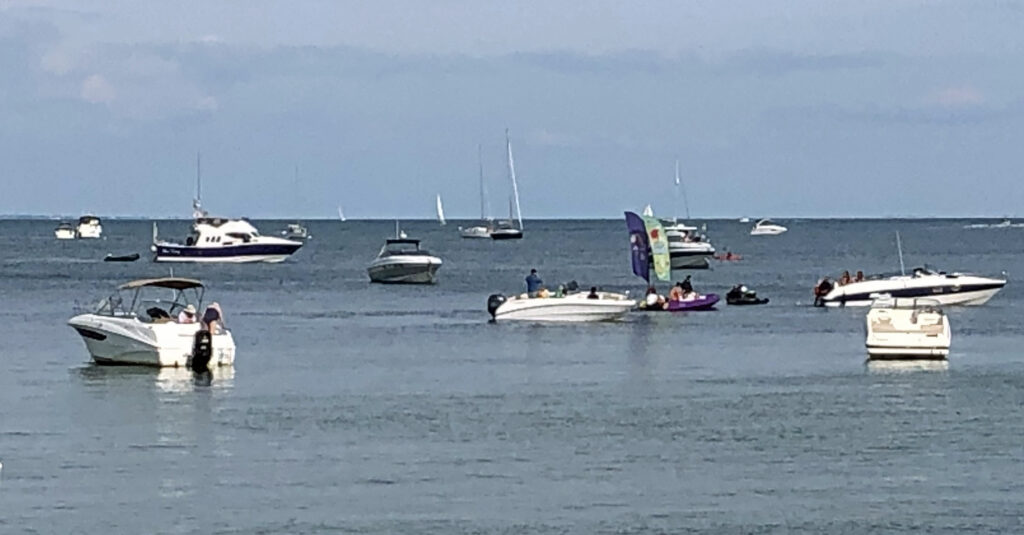
The aim is to allow boating to continue while also protecting the environment
“Phenomenal response to appeal”
But Seahorse Trust spokesman Neil Garrick-Maidment said:
“We are amazed at how much has been pledged over winter and absolutely thrilled that we have already reached the point where we can fund 22 new eco moorings to add to the 10 that we installed two years ago.
“There has been a phenomenal response to the funding appeal and we are thrilled to have reached this milestone, which will enable further protection for the precious seahorse population at Studland Bay.
“Most areas where boats like to anchor are highly sensitive areas for creatures like seahorses, and the seagrass meadows where they live, is a fragile, easily damaged environment.
“Heavy anchors being used on these sites cause intense and long lasting damage, leaving behind a devastated seabed and a huge loss of species.
“With dwindling seahorse numbers across the UK, simple steps such as putting down eco moorings bring space and time for recovery and will help to breathe new life into the seahorse herds at Studland.”
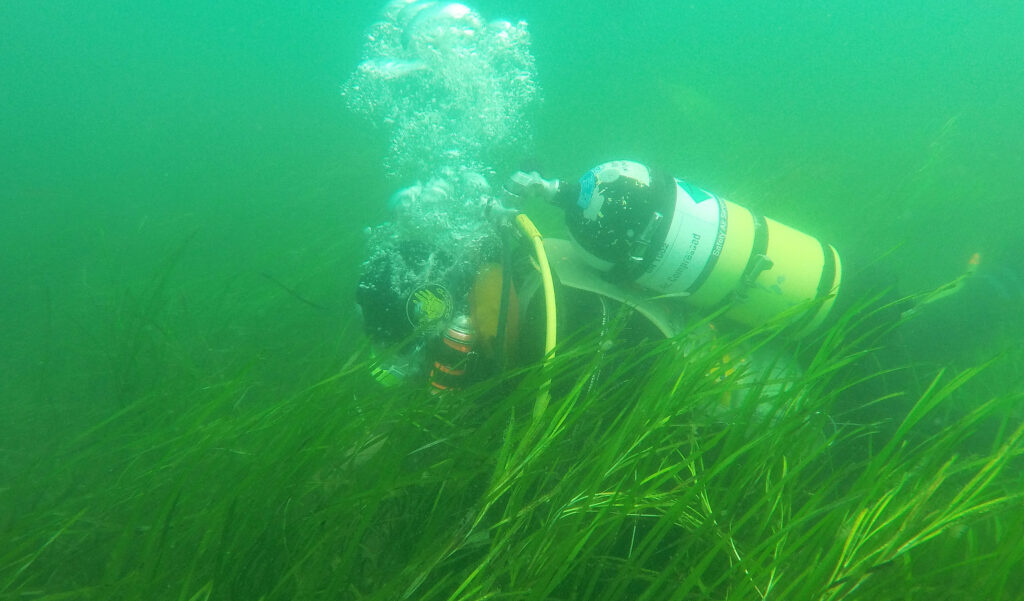
Southampton University divers monitor the health of Studland’s seagrass meadows
A vital role in carbon reduction
In August 2021, the Seahorse Trust and its partners at the boating and marina services company Boatfolk installed 10 eco moorings as the start of an ambitious project to take pressure off the sensitive site.
Studland’s seagrass meadows are an essential habitat for seahorses and other sealife such as rays and bass, and also play a vital role in carbon reduction, with the ability to store twice as much carbon per hectare as rainforests.
Studland Bay was designated as a protected Marine Conservation Zone in 2019 and a voluntary no anchor zone was introduced in December 2021 by the Marine Management Organisation.
During Covid lockdown, the bay saw a huge return in seahorse sightings, with double figures spotted in multiple dives, including 16 spotted in a single dive.
The fundraising effort and extension of the eco mooring scheme follows a period of consultation with local residents and boat users. Of those surveyed, 58 percent said they were interested in the conservation of the seagrass habitat.
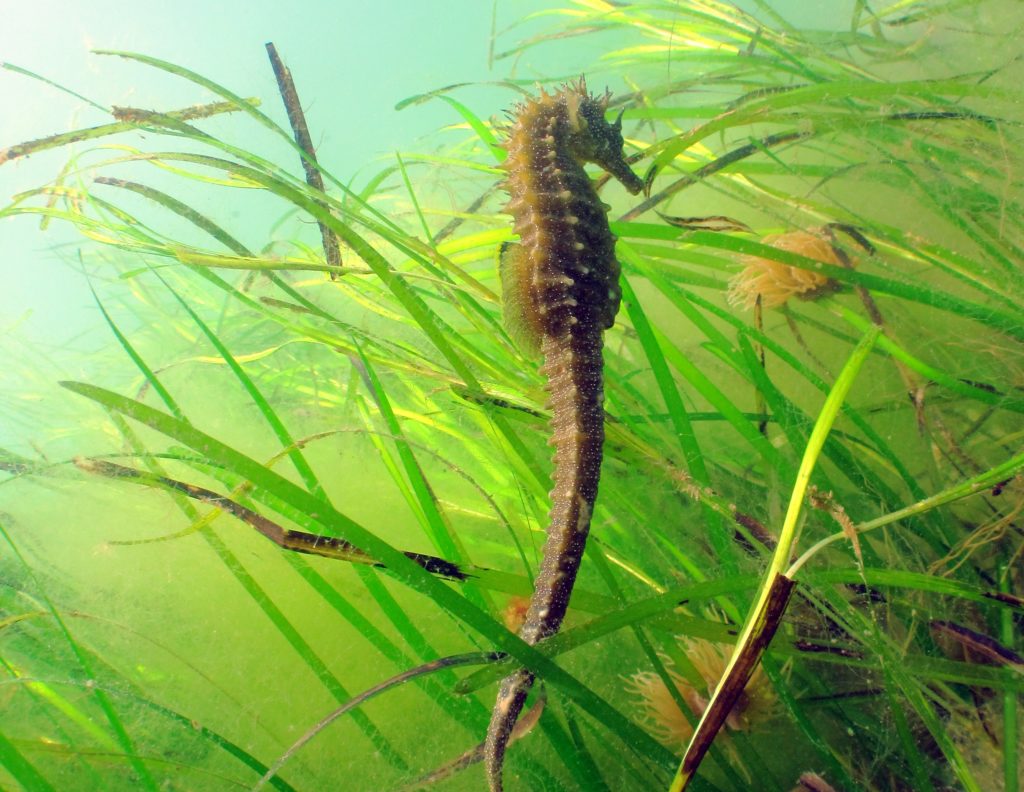
Seahorse will use their tails to hold onto seagrass while they feed
Recreation can continue while habitat recovers
For the National Trust in Purbeck, David Brown said:
“We are hugely grateful to the organisations who have kindly donated the necessary funds to help springboard this vital project to the next phase. Studland is important to the million plus visitors it receives every year, by sea and land.
“However, seagrass and the spiny seahorse are an emblem of British marine life and it is important that nature positive approaches such as eco-moorings are available, to enable recreation to continue whilst helping this precious habitat recover and thrive.”
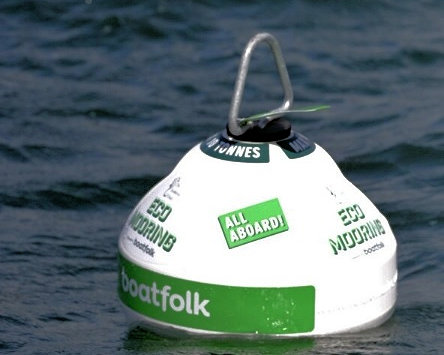
Eco buoys can be branded on behalf of sponsor companies
“Beyond my dreams after years of struggling”
Neil Garrick-Maidment added:
“We have ordered the next 22 eco buoys already, which are fully paid for thanks to incredibly generous giving – one individual even sponsored three in memory of loved ones.
“We hope to put them in during April and May before the seahorses come back in earnest from their winter homes in deeper water, but we are still looking to fund another 68 and hope that we might be able to brand some of them for sponsors.
“It is beyond my dreams after years of struggling to get things done, but now everyone seems to want to be part and parcel of protecting the seahorses and seagrass meadows.”
More information
- Further donations can be made at the Seahorse Trust’s Go Fund Me page
